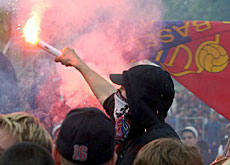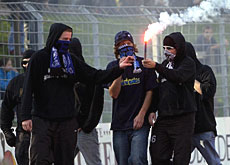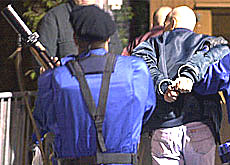Football turns the screw on hooliganism

Swiss football fans face a raft of new measures aimed at tightening security at stadiums and combating a rise in hooliganism.
The Swiss Football League (SFL) directives got their first test on Sunday when the second half of the season kicked off.
Thomas Helbling, who is responsible for security and fans at the SFL, told swissinfo that the authorities were engaged in “a battle for football’s soul”.
“What we want to do is improve security and fan culture, and show supporters that we are ready to tackle the problem [of hooliganism],” he said.
One of the biggest changes will see clubs penalised for the bad behaviour of their supporters at away grounds.
For the past two years, following a court ruling in favour of FC Zurich, clubs have been liable for the actions of their fans only in their own stadiums.
Many blame the recent upsurge in hooliganism and vandalism on the fact that fans have been able to act with relative impunity at other clubs.
Police in Switzerland traditionally remain outside grounds and it is left to security staff to control supporters inside stadiums.
Last season, Basel fans trashed FC Thun’s stadium, causing tens of thousands of francs of damage.
Disciplinary action
Clubs whose supporters misbehave now face the prospect of hefty fines, having to play matches behind closed doors, or even being docked points.
The various directives belatedly bring Switzerland into line with recommendations set out by Uefa, European football’s governing body.
But Helbling insists the Swiss have not been slow to react to the problem of hooliganism.
“In Switzerland this development of bad behaviour has been slower than in other countries such as England, Holland and Germany,” he said.
“But we recognise now that the stadium has more and more become a place where you can behave badly without risk of punishment.”
Disturbances
Clubs, however, will remain exempt from disciplinary action for disturbances that take place outside stadiums. These will remain the responsibility of the police.
The Federal Police Office has already indicated that it aims to rein in troublemakers ahead of the Euro 2008 football championships, which are being hosted jointly by Switzerland and Austria.
Planned measures to be discussed by parliament include a database of known football hooligans, use of preventive detention and the introduction of travel and stadium bans.
The SFL, which has welcomed the police proposals, says the absence of a databank makes it difficult to track and identify troublemakers.
Another important step sees the introduction of a uniform set of rules for all clubs on access to stadiums and banned objects.
The list covers everything from knives, baseball bats and knuckle-dusters to flares and fireworks.
Clubs and fans
To ensure the message gets across to fans, clubs have been ordered to appoint a liaison officer to act as a go-between.
“We now have the same standard all over Switzerland and this is important for the fans,” said Helbling.
“They now know what they will face when they enter a stadium in St Gallen, Bern, Neuchâtel or wherever.”
A detailed list of measures to improve safety at football grounds has been sent out to stadium security chiefs. The SFL is also increasing the number of stadium inspections.
Terence Wilsher, head of security at Neuchâtel Xamax, currently in third place in the Super League, told swissinfo that the laying down of uniform rules and regulations for clubs was long overdue.
But he welcomed the shift towards greater professionalism, especially in the area of stadium security.
“The security situation has got worse and worse and it really is a big problem now,” he said. “There’s rarely a game goes by when there’s no fighting or vandalism.”
Responsibility for fans
Wilsher added that it was now up to clubs to build a relationship with their fans and to make them aware of the consequences of their actions.
But he believes clubs will not be able to stamp out hooliganism on their own.
“As far as things stand now, we are not going to get there. The only thing that will change things is strong action by the courts. At the moment they are too soft,” said Wilsher.
Helbling says he is not expecting Swiss fans to become reformed characters overnight, stressing that it will take time for a change in mentality.
“Sadly, we are taking our first steps in this domain and we have not gone very far,” he said.
“But we have to invest in security, because at the end of the day if we don’t do this then our football will lose its heart and then the 95 per cent of well-behaved fans will stop coming.”
swissinfo, Adam Beaumont
The Swiss Football Association has introduced measures to reduce the risk of match-fixing, by delaying naming referees until the day of important games.
The move comes in the wake of a scandal in neighbouring Germany in which a referee has admitted rigging several matches.
The SFA said referees had also agreed to sign a code of conduct reinforcing their loyalty and honesty.
Police estimate there are between 300 and 400 football hooligans in Switzerland.
The authorities fear that rightwing extremists are trying to recruit new members among violent soccer supporters.
A 2003 report on Internal Security showed an increase in attacks by skinheads and hooligans on supporters and security forces.

In compliance with the JTI standards
More: SWI swissinfo.ch certified by the Journalism Trust Initiative


You can find an overview of ongoing debates with our journalists here. Please join us!
If you want to start a conversation about a topic raised in this article or want to report factual errors, email us at english@swissinfo.ch.